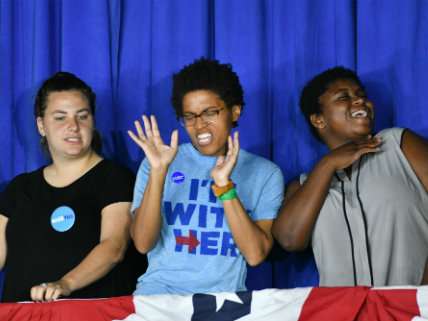Dear Democrats: No One Owes You Their Vote
Clinton has been going full-force Millennial Whisperer recently, after learning that she's losing young voters to Gary Johnson and Jill Stein. Why it won't help.


The Hillary Clinton campaign thought for sure it could count on a few key demographics: racial minorities, gay voters, young women, and to some extent young people broadly. Now that many of these groups—but especially the kids—have proven less gung-ho about her than expected, Clinton is going full-force Millennial Whisperer, throwing out free-college proposals and Pepe the Frog references with abandon as her minions in media and politics hammer home one point: a vote for a third-party presidential candidate this November is a vote for Donald Trump.
The new rhetoric comes in response to several signs that millennials won't simply go good-German in a post-Bernie world. In the latest Quinnipiac national poll, just 31 percent of 18- to 34-year-old voters favored Clinton, with 29 percent for Libertarian Gary Johnson and 15 percent for Green Party candidate Jill Stein. Another recent poll, this one from New York Times/CBS News, found 26 percent of 18- to 29-year-old respondents saying they would vote for Johnson and 10 percent professing support for Stein.
"A month ago Democrats were amused to see Johnson leading Trump along millennials," noted Dave Weigel at The Washington Post Monday. "Now, Johnson's support is being tackled like a crisis."
The anti-third-party message has been coming from Clinton herself—on Monday, she gave a speech at Temple University "laying out the stakes of November's election for millennial voters"—and from new YouTube and TV commercials put out by Clinton SuperPAC Priorities USA. It's coming from Clinton surrogates like Sen. Bernie Sanders and Elizabeth Warren, speaking on Facebook and at swing-state college campuses; and from pro-establishment voices in the media, such as The New York Times columnist Paul Krugman and Mother Jones executive editor Clara Jeffery.
On Thursday, Jeffery tweeted the results of a new poll showing high support for third-party candidates among young voters with the comment: "I have never hated millennials more."
Jeffery's comment typifies a certain sort of left-leaning boomer leap-of-logic wherein the large number of Trump supporters within their own ranks aren't the issue and its the under-35 crowd's rejection of both Trump and Clinton that is truly unconscionable. Meanwhile, Krugman weighed in today on whether any sane person could vote for Gary Johnson, concluding sure—if they think it makes no difference whether Trump or Clinton gets elected and they agree with every policy position Johnson takes.
The last bit is an especially strange assertion to make while simultaneously arguing for those who don't love Clinton to support her because she's better than the alternative. In Krugman's column logic, voting for Clinton while opposing much of what she stands for is righteous and normal while voting for Johnson because you support much of what he stands for is absurd unless you also agree with him 100 percent on environmental regulation, Medicare, school choice, and everything else.
Riffing on Krugman, let's ask a similar question: Does it make sense for millennials or racial minorities to vote for Hillary Clinton, the Democratic candidate for president, when they really want to vote for a third-party candidate?
Sure, as long as you believe a few things. First, you have to accept a system in which two increasingly similar and incoherent political parties get to dominate American politics in perpetuity and in which the quality (or lack thereof) of the candidates they put forth makes zero difference. Second, you have to believe that Donald Trump presents an unprecedented threat to American society and this election holds unique historical significance that subsequent elections will not match. And third, you have to believe that certain classes of people can and should reliably be expected to vote against their own consciences and material interests to serve the greater good as it is perceived by an elite ruling class.
The problem for Clinton, I suspect, is that very few of the voters she's seeking to sway away from third parties—be they millennials or whoever—believe all those things. The people who would even consider a third-party vote in the first place tend to either be true believers in that philosophy or so fed up with (one or both) parties that they're desperate for an alternative. Neither group seems likely to be swayed by appeals to how its their job to see that the lesser of two evils gets elected and their fault alone if that doesn't happen. In fact, it's that very attitude that turns people to third parties in the first place.
There are many people for whom Clinton's current rhetoric resonates, though. When I was home in Ohio last week, I heard some iteration of it—or its reverse, that voting third-party would tragically throw the election toward Clinton—from all sorts of older relatives and other folks for whom voting either Republican or Democrat is almost always a given. Which makes sense: the types to see their side as reliably better than anything the other side has to offer will of course reject any courses of action that could boost the other side, even if they despise their own party's candidate (which was also pretty par for the course among those I consulted). As a get-out-the-vote strategy for generally committed partisans, then, drumming up third-party fears seems to be a fine tactic.
Absolutely hate this framing of the necessity of voting (for Democrats) that places all the blame on marginalized and young folks.
— Vann R. Newkirk II (@fivefifths) September 18, 2016
But where this shame-based messaging works less well is with the very people that Clinton is courting. Telling people to vote for someone they don't trust or believe in simply to stop someone else they don't believe in from taking power plays right into people's major complaints about Clinton—that she's a sellout for whom power trumps principles; that she'll say anything to get elected; that she's running more on symbolism than substance.
And as several young Sanders supporters told Weigel, they're open to Clinton but don't believe she's genuine or will keep promises she makes on the campaign trail. They want a reason to believe, but she isn't delivering.
Yet rather than focusing on ratcheting up her credibility on issues that are important to independent voters, instead Clinton's campaign has turned to bullying. Her message—vote for me no matter how bad I am or else the truly bad guys win—is just a subtler (and yet more cynical) version of Trump's "I alone can save you" rhetoric.
It's not surprising, unfortunately. Historically, the Clinton campaign and its allies have always gotten nasty when the going gets tough. When young voters went overwhelmingly for Sanders in the Democratic primaries, Clinton and company were quick to chastise young male "Bernie Bros" for sexism and young women for voting socialist so boys would like them. During the 2008 election season, Clinton cast Obama's higher ratings as a toxic mix of sexism and unfounded black-on-black voting habits. Clinton's entire presidential oeuvre has been built on one motif: she's owed this goddamn office and anyone who can't see that is deplorable.
But for a lot of idealistic young voters, "hey, at least she's not Trump" just isn't inspiring enough to warrant a vote for Clinton. And the idea that they, by virtue of being young, or black, or any other surface attribute typically associated with liberal voting, owe the Democrats their electoral devotion as a matter of course is downright insulting. It typifies an upper-class feminist/liberal agenda in which good minority-groups of all sorts are supposed to go along to get along—to subsume their own specific goals to some general progressive political good—even when it repeatedly leaves them on the margins. That Clinton and Democrats feel so comfortable shaming certain classes of people for voting in accordance with their own values and interests illustrates just how much Clinton and the mainstream left takes these groups for granted.
A vote for neither Clinton nor Trump—whether that means casting a ballot for Johnson, Stein, or some other candidate or abstaining from voting altogether—can say to the ruling parties that people are tired of being taken for granted (or tired of being offered a choice between a turd sandwich and a giant douche, as South Park would put it) and that Democrats and Republicans need to do better next time. That's important, too.


Show Comments (174)